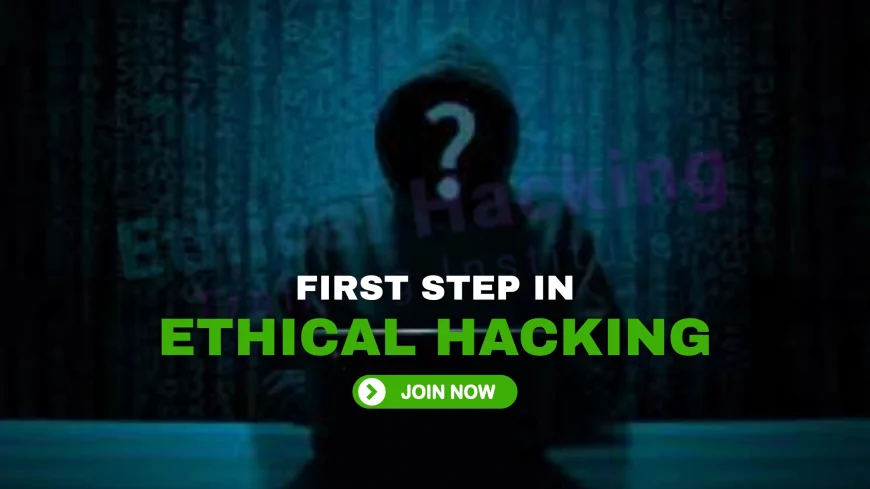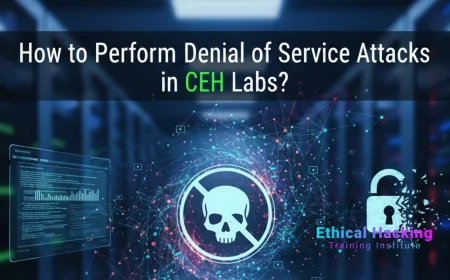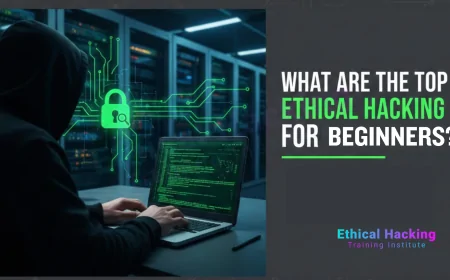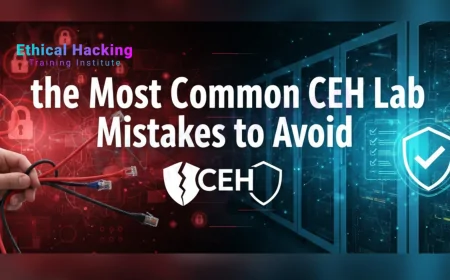Ethical Hacking Class: How to Prepare for Your First Ethical Hacking Training | Beginner’s Guide: Preparing for Your First Ethical Hacking Class
Start your ethical hacking journey with confidence. Learn how to prepare for your first class, required tools, skills, certifications, and real-world practice tips.

Table of Contents
- Introduction
- What Is Ethical Hacking?
- Why Ethical Hacking Matters
- Before You Join an Ethical Hacking Class
- Basic Skills Needed Before Starting
- Tools Commonly Used in Ethical Hacking
- What to Expect in Your First Class
- Best Resources to Start Learning
- Types of Ethical Hacking Classes
- Certifications Linked to Training
- Beginner Mistakes to Avoid
- Importance of Labs and Practical Practice
- Working on Real Projects and Simulations
- Career Opportunities After Training
- Tips to Maximize Your Learning
- Join the Community and Network
- Continuing Your Ethical Hacking Education
- Soft Skills You’ll Also Need
- FAQs
- Conclusion
Introduction
With cyber threats growing more advanced by the day, the role of ethical hackers—cybersecurity experts who protect systems legally—is more critical than ever. If you're thinking of enrolling in your first ethical hacking class, you're already on the right track to a highly rewarding and in-demand career.
This guide covers everything you need to know before stepping into your first class—from essential skills, tools, and certifications to what to expect and how to excel. Let’s dive in.
What Is Ethical Hacking?
Ethical hacking involves simulating cyberattacks on systems to discover vulnerabilities before malicious hackers can exploit them. Ethical hackers are often hired by companies, governments, or third-party firms to secure systems, applications, and networks.
Why Ethical Hacking Matters
Cybercrime damages cost companies billions of dollars annually. Ethical hackers help prevent data breaches, secure digital assets, and maintain public trust. With cybersecurity being a top priority globally, trained professionals are in high demand.
Before You Join an Ethical Hacking Class
Before registering for any class, consider the following:
- Are you interested in cybersecurity and how systems work?
- Do you have a basic understanding of computers and networks?
- Are you willing to commit time to practice outside class hours?
Basic Skills Needed Before Starting
You don’t need to be an expert, but having the following foundational knowledge will help:
- Understanding of operating systems (especially Linux)
- Basic networking concepts (IP, DNS, TCP/IP)
- Introductory knowledge of programming (Python or Bash)
Tools Commonly Used in Ethical Hacking
Here are some tools you'll likely use in your training:
- Wireshark: For network packet analysis
- Metasploit: Exploitation and vulnerability testing
- Nmap: Network scanning and enumeration
- Burp Suite: Web application security testing
What to Expect in Your First Class
Your first ethical hacking class may include:
- Introduction to ethical hacking concepts
- Legal and ethical responsibilities
- Setting up lab environments (like Kali Linux or VirtualBox)
- Initial tool demos and system security basics
Best Resources to Start Learning
Explore these to get a head-start:
- TryHackMe – Guided labs for beginners
- Hack The Box – Advanced lab environments
- Cybrary – Free cybersecurity courses
Types of Ethical Hacking Classes
- Online Bootcamps: Intensive and flexible
- Classroom Training: Instructor-led with peer interaction
- Self-Paced Courses: Ideal for working professionals
Certifications Linked to Training
Most classes prepare you for certifications like:
- CEH (Certified Ethical Hacker)
- OSCP (Offensive Security Certified Professional)
- eJPT (eLearnSecurity Junior Penetration Tester)
Beginner Mistakes to Avoid
- Skipping foundational networking knowledge
- Using tools without understanding them
- Neglecting legal and ethical boundaries
Importance of Labs and Practical Practice
In ethical hacking, theory alone is not enough—practical, hands-on experience is what truly shapes a successful cybersecurity professional. Labs and simulation environments allow learners to apply theoretical knowledge in real-world scenarios, helping bridge the gap between learning and doing.
Ethical hacking tools such as Nmap, Metasploit, Wireshark, and Burp Suite are powerful but can be complex for beginners. Without regular practice in a controlled lab, it’s difficult to understand how these tools function in live environments. Labs provide a safe platform to run scans, exploit vulnerabilities, analyze traffic, and perform penetration testing without causing harm.
Virtual lab platforms like TryHackMe, Hack The Box, and custom Kali Linux setups simulate enterprise systems and real attack vectors. Practicing in these labs enhances troubleshooting, critical thinking, and attack-path mapping—skills that hiring managers look for in ethical hackers.
Moreover, labs help reinforce muscle memory. Repeating technical processes (like privilege escalation or password cracking) builds confidence and sharpens instincts. This hands-on ability becomes essential during interviews, certification exams (like OSCP or CEH), and on-the-job tasks.
Simply put, labs are where you make mistakes, learn from them, and grow stronger as a hacker. For anyone serious about ethical hacking, consistent lab practice is not optional—it’s foundational.
Working on Real Projects and Simulations
While labs help you grasp tools and techniques, working on real-world projects and simulations is what prepares you for practical cybersecurity challenges. These projects simulate real attack-and-defense scenarios, allowing you to apply your ethical hacking skills in a more dynamic and unpredictable environment.
Real projects often involve tasks such as securing a company’s network, identifying vulnerabilities in web applications, or performing full-scope penetration tests. These simulations go beyond isolated lab exercises and teach you how to handle multi-layered systems, misconfigurations, and exploit chains, just like in real jobs.
Capture The Flag (CTF) events, mock red team vs. blue team exercises, and penetration test reports are excellent ways to build real project experience. Platforms like Hack The Box, PortSwigger Web Security Academy, and VulnHub offer immersive environments to hone your skills in live simulations.
Including these experiences in your portfolio or résumé makes you stand out to employers. It demonstrates not only your technical capability but also your ability to document findings, explain attack paths, and recommend fixes—just like you would in a real-world cybersecurity role.
In short, simulations and real projects bring ethical hacking to life. They build confidence, improve problem-solving, and are essential for anyone aiming to work in penetration testing, threat hunting, or cybersecurity consulting.
Career Opportunities After Training
After training, you can explore roles such as:
- Junior Penetration Tester
- Security Analyst
- Cybersecurity Consultant
- Bug Bounty Researcher
Tips to Maximize Your Learning
- Practice regularly on free platforms
- Participate in CTF events
- Build a home lab setup
- Follow ethical hackers on GitHub and Twitter
Join the Community and Network
Learning ethical hacking isn't just about mastering tools and techniques—it’s also about becoming part of a thriving global community. Networking with like-minded individuals helps you stay motivated, discover opportunities, and gain deeper insights into the field.
Joining ethical hacking and cybersecurity communities exposes you to the latest vulnerabilities, hacking tools, industry news, and career tips. Online forums like Reddit’s r/netsec, Stack Exchange Security, and Null Community (India) are great places to ask questions, share knowledge, and collaborate on challenges.
You can also participate in Discord servers, LinkedIn groups, and Telegram channels dedicated to cybersecurity learners and professionals. These platforms are often buzzing with discussions on malware analysis, CTF writeups, zero-day vulnerabilities, and tool recommendations.
Attending cybersecurity conferences (like DEF CON, Black Hat, BSides, or local OWASP chapter meetups) is another excellent way to connect with industry experts and recruiters. Many companies also sponsor online hackathons and bug bounty events where you can earn money, showcase your skills, and build your reputation.
Networking isn’t just about getting a job—it’s about building relationships that support your long-term growth. By joining the community, you gain access to mentorship, project collaborations, and insider opportunities that textbooks and tutorials alone can’t provide.
Continuing Your Ethical Hacking Education
Even after your first class, ethical hacking is a lifelong learning field. Keep exploring advanced topics like reverse engineering, red teaming, and malware analysis.
Soft Skills You’ll Also Need
Besides technical expertise, employers look for:
- Problem-solving skills
- Critical thinking
- Communication and documentation skills
- Team collaboration
Frequently Asked Questions (FAQs)
1. Do I need a computer science degree to join an ethical hacking class?
No, but having basic computer and networking knowledge is helpful.
2. Can beginners join ethical hacking training?
Yes. Many classes are tailored specifically for beginners and teach foundational concepts.
3. How long is a typical ethical hacking course?
It can range from a few weeks (bootcamps) to several months (certification courses).
4. Do I need to know coding for ethical hacking?
Basic coding (e.g., Python, Bash) is very helpful but not always mandatory at the start.
5. Is ethical hacking legal?
Yes, as long as it’s done with authorization and within legal boundaries.
6. What is CEH?
Certified Ethical Hacker (CEH) is a globally recognized certification for ethical hackers offered by EC-Council.
7. Is online ethical hacking training effective?
Yes, if it includes hands-on labs, instructor support, and real-world practice.
8. How can I practice ethical hacking at home?
Set up a virtual lab with tools like Kali Linux, and use platforms like TryHackMe or Hack The Box.
9. Do I need high-end hardware to start?
No. A decent laptop with 8GB RAM and virtualization support is enough for most training needs.
10. Will I get a job after completing one course?
Courses are a great start, but building skills through projects, labs, and certifications increases job chances.
11. Can school students learn ethical hacking?
Yes, but they should focus on legal awareness, basics, and age-appropriate platforms.
12. Are free ethical hacking classes available?
Yes. Platforms like Cybrary, Udemy, and YouTube offer beginner-friendly free content.
13. What are the risks of practicing without permission?
Practicing hacking on unauthorized systems is illegal and punishable. Always use legal environments.
14. Which OS is used in training?
Linux distributions like Kali Linux or Parrot OS are commonly used for training.
15. What is a home lab?
A setup with virtual machines and tools to simulate hacking scenarios safely at home.
16. Can I pursue ethical hacking part-time?
Yes. Many classes offer evening or weekend schedules suitable for working professionals.
17. What is red teaming?
A cybersecurity exercise where ethical hackers simulate real attacks to test defenses.
18. How do I know if I’m ready for CEH?
If you're confident with basic tools, labs, and cybersecurity principles, you’re ready to begin CEH prep.
19. Are ethical hackers in demand?
Yes. Ethical hacking is one of the most in-demand IT jobs globally due to rising cyber threats.
20. Can I work remotely as an ethical hacker?
Yes. Many penetration testing and cybersecurity roles offer remote or hybrid work options.
Conclusion
Stepping into your first ethical hacking class is the beginning of an exciting journey in cybersecurity. By preparing yourself with basic networking and system knowledge, familiarizing yourself with tools, and maintaining a learning mindset, you’ll set yourself up for success. Whether you're aiming for CEH certification or dreaming of becoming a penetration tester, your first step into ethical hacking training is the foundation for a rewarding and impactful career.
What's Your Reaction?
 Like
0
Like
0
 Dislike
0
Dislike
0
 Love
0
Love
0
 Funny
0
Funny
0
 Angry
0
Angry
0
 Sad
0
Sad
0
 Wow
0
Wow
0


















